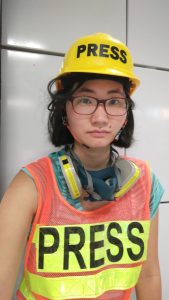Working as a journalist in Hong Kong, Linda Lew has drawn on her experience from OpenCon in her coverage of the novel coronavirus.
The early career reporter for the South China Morning Post went to Wuhan, China in early January to cover the outbreak of the then-unknown virus. Lew went in with as much precautions as were suggested at the time – a facemask, gloves, and disinfecting spray. Looking back, she says she’s lucky that she didn’t contract COVID-19. Since then, Lew has sometimes been putting in 10-12 hour days writing articles on everything from policies to politics to the impact of the global pandemic on scholarly communication.
“COVID has shined a large spotlight on the exorbitant cost of academic publishing,” Lew says. “When the virus first spread in February, it felt to me, personally—and to other members of the OpenCon community—that it was unacceptable that so much of COVID research was still behind paywalls. That kind of outdated model just boggles my mind when a pandemic is on.”
Many publishers have granted access to critical research in response to the crisis, but Lew worries that it is temporary. In her reporting, she is trying to explain the need for open science and open access to readers—many of whom are not aware of the issue. Even her editor, Lew says, was baffled when she explained how commercial publishers make high profits from tax-payer funded that is not open to the public.
Lew attended OpenCon in 2016 and 2017 curious to learn more about how to make knowledge available to her readers. She then served on OpenCon’s organizing committee in 2018.
“When I saw this community of people who were fighting to change the status quo and driving more equal access to data, I applied,” Lew says. “As journalists, we are public facing and trying to bring information to the masses. That was the goal in my mind.”
Lew says she left OpenCon eager to find ways to collaborate with other journalists and has since taken advantage of crowd sourcing projects. She plans to participate in an online COVID-19 monitoring project, sponsored by the Correspondent, calling for journalists to help build a database of policies to compare trends in technology surveillance of the virus.
Recently, Lew has written about preprints and the rapid peer review process to help the research community find the best science related to COVID-19. The article has been getting traction from advocates of open and push back from publisher trade industry groups.
“As time goes on, most of the COVID research has been made freely available,” says Lew, who has been at the Post since 2018. “The question remains whether the model will remain the way it is… or only become open when an outbreak happens, which does not seem fair to advocates of Open Access.”
With so much attention on Open Science at the moment, Lew says she is likely going to cover the topic more. She’s been able to leverage connections she made at OpenCon for sources in her reporting. As the concept of open is more broadly understood by the public, Lew says she is optimistic support will grow.
“We really need to think of a more sustainable and equitable model going forward,” Lew says. “I hope maybe through the media coverage and the change that has happened, this can be more on top of people’s mind.”
